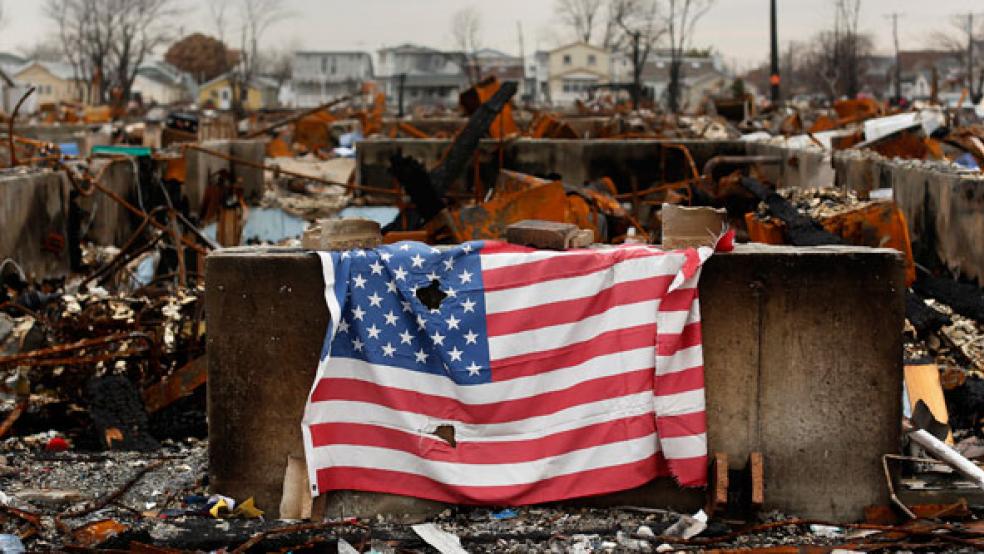The House on Tuesday approved $50 billion in relief for victims of Hurricane Sandy, a package designed to speed aid to devastated communities in New York and New Jersey, and a vote that provided an early test of the resolve of Republican deficit hawks.

The package was adopted on a 241 to 80 vote, on the strength of support from Democrats, as well as 49 Republicans, who mostly hail from communities hit hard by the Oct. 29, 2012, storm.
It overcame a tough challenge from fiscal conservatives who believed the emergency spending should be offset with spending cuts in other parts of the federal budget to avoid adding to the federal debt.
Most Republicans — 179 in all — opposed the final package, an outcome that would have once been unthinkable in the GOP-led chamber. But it was the second vote in recent weeks to pass with a majority of Democratic votes.
Most Republicans also opposed the tax deal that concluded the fiscal cliff package earlier this month. House Speaker John A. Boehner (R-Ohio) allowed both votes to proceed knowing they would likely be adopted mostly through the work of Democrats.
RELATED: Congress Piles the Pork into Hurricane Sandy Relief
A majority of Republicans also supported a failed amendment that would have offset a large chunk of the spending with other budget cuts. The move was fended off by the same coalition of Democrats and a smaller number of Republicans who feared it would derail the bill in the Senate.
But Boehner needed to get past the Sandy issue. He earned a stinging rebuke from New Jersey Gov. Chris Christie (R) earlier this month and designed a complicated legislative pathway to ensure its passage despite muted Republican support.
First, the House agreed to an underlying bill that included $17 billion intended to cover immediate relief needs, including $5.4 billion for the FEMA fund that funnels aid directly to individuals and local communities to rebuild. The measure passed on a 327 to 91 vote.Then, on a 228 to 192 vote, the House tacked on $33.6 billion in additional money to cover a longer-term effort to rebuild.
Splitting the bill into two pieces allowed Republicans who wanted to provide immediate help to be able to withhold their votes from the long-term effort; only 38 Republicans backed adding the longer-term dollars.
Supporters say all of the money is desperately needed — Christie and New York Gov. Andrew M. Cuomo (D) have requested nearly $80 billion in federal aid.

Together, the $50.6 billion, along with $9.7 billion for flood relief approved by the House earlier this month, would equal a package passed in December on a bipartisan basis in the Senate.
Backers had feared changes to the package could disrupt passage in the Senate. “We don’t want to find ourselves with a bill the Senate can’t take, and we’ll have to ping-pong around here for a few months,” said Rep. Louise M. Slaughter (D-N.Y.). “It’s important that we get this done and get it done quickly.”
Sen. Charles E. Schumer (D-N.Y.) said late Tuesday that the House bill, while not as good as Senate’s product, was “close enough” and he would urge colleagues to pass it speedily.
To appease conservatives, House leaders had allowed votes on a dozen amendments — chosen from among more than 90 proposed by members — many of which would slice out spending projects that some conservatives consider not directly related to storm relief. Most were unsuccessful.
That included a key amendment proposed by Rep. Mick Mulvaney (R-S.C.) and backed by the conservative Club for Growth that would have offset the $17 billion underlying measure by cutting 1.63 percent from every federal agency, including the military.
Traditionally, storm relief is considered emergency spending, much like money to fund wars and appropriated quickly by Congress on top of other spending priorities. But some fiscal conservatives have expressed exasperation with that notion. The total $60 billion relief package is larger than the budgets of many states. It also would swallow up more than half of the spending cuts set to take effect next month as part of the hard-fought sequester process, which was designed to begin denting the federal deficit.
“We’re spending money we don’t have. We just have to control our spending,” said Rep. Paul C. Broun (R-Ga.), explaining why conservatives sought offsetting cuts.
But Mulvaney's proposal fell on a 162 to 258 vote after House Appropriations Committee Chairman Harold Rogers (R-Ky.) appealed to colleagues that the across-the-board offsetting cut would cause indiscriminate damage to federal programs. He noted that the cut would total more than the size of the entire Agriculture Department.
“At times, the spending of federal dollars is indeed necessary,” he said. “Natural disasters hit unexpectedly, and sometimes require a response that we cannot foresee.”
House Majority Leader Eric Cantor (R-Va.) and former GOP vice presidential candidate Rep. Paul Ryan (R-Wis.) were among the 157 Republicans who voted for the failed amendment.
This piece originally appeared in The Washington Post.




